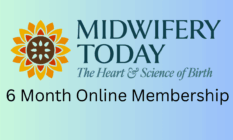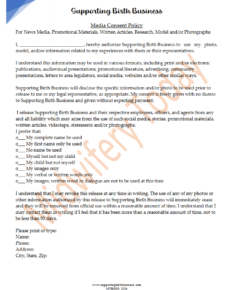
The Issue of Birth Rights
Editor’s note: This article first appeared in Midwifery Today, Issue 94, Summer 2010.
Subscribe to Midwifery Today Magazine

Photo of Sister and Jan Tritten provided by the author
We are creatures. We are animals. It is not a bad or lowly thing to be. It allows us to eat and poop and get in out of the cold and enjoy mating and flee danger. We embody an instinct that is backed by millions of years of invested intelligence. It certainly includes birth. It most certainly includes birth.
Who thought of holding legs above a pelvis with stirrups or shaving pubic hair to help create a sterile field or inserting enemas for cleanliness or providing strangers for companions? Certainly not creature mothers and babies. They would kick and bite and run for the hills. They wouldn’t need to consult books or experts. Their instinctual knowing only takes a second to be consulted. The answer and response is automatic. It takes force, mighty force, to restrain an instinctual animal in the moment of performing a bodily function, especially birth. Have we successfully used intellectual fear to overpower the instinctual fear of a birthing human, so she will now submit to actions that otherwise would make her bite and kick and run for the hills?
Disturbed, the bodily function of an instinctual animal will stop. If the biological function is birth, the lives of the mother and baby(ies) are endangered by the disturbance. We know these facts. Zookeepers, farmers and animal activists defend animal rights based on these facts. The wildlife environment may be shrinking on the planet, but not for any large species more than the human female in birth. The farmers in rural Missouri have a right to shoot anyone or anything coming on their property and disturbing the welfare or functions of their animals. For disturbing them. That is a powerful right. When working with the Mennonite farmers of Missouri, all I had to do was compare the care a dairy farmer would give to his best cows to the similar needs of his wife, and I would behold the automatic increase in loving care and attention and protection. Humans are animals, too. Humans deserve such defending and such protecting. Humans deserve the right to birth in their natural environment where they feel safe and with their own “kind.” Animal rights have become a political and legal issue. It is not surprising that in order for birth to be included as a human right, it, too, has become a political issue. Long before it is political, it is personal. Just as every wild creature creates her instinctual nest and thereby preserves and passes on a flow of species intelligence, so, too, every human mother who births according to her instinctual nature is preserving and passing on a flow of the highest species intelligence known on this planet. We must consider very carefully before we disturb her or disempower her or weaken her instinct. She is a sacred creature. She is us.

 Sister MorningStar has dedicated a lifetime to the preservation of instinctual birth. She birthed her own daughters at home and has helped thousands of other women find empowerment through instinctual birth. She is the founder of a spiritual retreat center and author of books related to instinctual and spiritual living. She lives as a Cherokee hermitess and Catholic mystic in the Ozark Mountains of Missouri. Visit her on the web at:
Sister MorningStar has dedicated a lifetime to the preservation of instinctual birth. She birthed her own daughters at home and has helped thousands of other women find empowerment through instinctual birth. She is the founder of a spiritual retreat center and author of books related to instinctual and spiritual living. She lives as a Cherokee hermitess and Catholic mystic in the Ozark Mountains of Missouri. Visit her on the web at: 



















